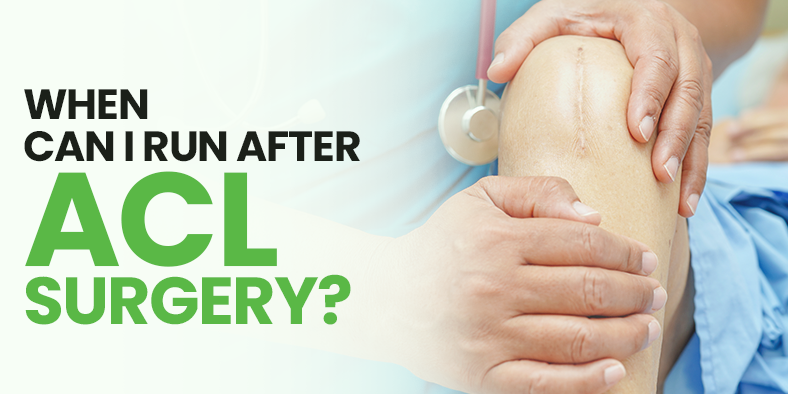Are you wondering, “When can I run after ACL surgery?” if you have had ACL surgery or are getting ready for one? You may not believe that you’ll be up and about for a while, but with the correct support, the path to recovery might seem lengthy and unclear. This blog will guide you through the post-surgery running timetable, recovery-influencing elements, and dos and don’ts to guarantee a seamless return to your exercise regimen.
How Long After ACL Surgery Can You Start Jogging?
Patience is the key to healing from ACL surgery. Many athletic and physically active people are excited to return to their routine, especially jogging, but doing so too quickly might backfire. So, When Can I Run After ACL Surgery?
After surgery, jogging may usually start three to six months later. This period varies based on several variables, including
- Associated Injuries like Meniscus tears, cartilage lesions and other ligament injuries.
- Choice of graft used
- Severity of the injury
- How quickly your body heals, and the rehabilitation regimen you’re on.
You will be continuously monitored by your physical therapist or surgeon, who will decide when it is safe for you to resume your jogging routine.
Since your knee will still develop strength and stability, you must begin with gentle jogging instead of vigorous running. You may ease back into your habit and lessen the strain on your recovering knee by jogging on something soft like grass or a track.
Does Running Stress the ACL?
Many patients, especially after surgery, wonder if running puts additional strain on the ACL. The simple answer is that while running might cause stress on your ACL, it is still safe to do so when your injury has fully healed.
Running is a high-impact exercise that strains your knees, therefore it’s important to resume your activities following surgery gradually. Your ACL is still recovering when you start jogging after surgery, so starting too soon or too hard might make you more vulnerable to damage.
This is the reason it’s critical to heed the advice of your therapist and doctor. They will assist you in determining when you may start running and jogging without endangering your ACL. Running is still safe to resume, but only when your body is fully prepared.
RISK : Starting running / jumping / jogging or sports too soon after your surgery may lead to Partial Loosening and laxity in your ACL, and in repetitive cases , even retear of the ACL Graft.
Can I Jog with an ACL Tear?
If your ACL injury is causing you discomfort, you may be tempted to continue running even though you haven’t had surgery yet. Running or jogging with an ACL tear, however, might exacerbate the injury. Your knee is susceptible to further damage if the ACL isn’t there to give stability.
Many athletes attempt to “push through” their discomfort, but this strategy carries danger. Running with an ACL injury increases the risk of developing new ailments such as cartilage damage or meniscus tears. Developing Injuries to other Knee Ligaments is a realtime risk associated with repeated episodes of instability / imbalance after ACL injury of your knee.
Seeking advice from an orthopaedic surgeon such as Dr Siddharth Aggarwal is always a smart option if you want a precise diagnosis and a customised treatment plan. You might need to undergo surgery or therapy before you can safely resume jogging in any capacity.
Walking Timeline After ACL Surgery
Before asking yourself, “When can I run after ACL surgery,” consider that walking should be your first achievement. After ACL surgery, the following is a general chronology of what to expect while walking:
First Week
During the first few days following surgery, WALKER shall probably be required for mobility. Reduced swelling, preservation of knee mobility, and a gradual restoration of range of motion are the objectives during this period. Walker is necessary as it relieves pressure on your knee and promotes appropriate healing.
Weeks 2 through 4
You’ll begin to gradually go from using walker to walking on your own. You will be guided through this procedure by your physician or physical therapist, who will make sure that you do not overuse your knee. During this stage, walking is usually slow and methodical, with an emphasis on form.
Weeks 4 through 6
Many people are now walking comfortably. Strengthening the muscles surrounding your knee to provide stability will be the main goal of your physical therapy sessions. Even though walking should be pleasant, you can still feel a little stiff or swollen. In most of the patients, car driving is allowed at 1 month Post-operative.
After 6 Weeks
Walking ought to seem a lot more natural at this stage, and you should be progressively increasing the amount of movement you do. But until your knee regains its full strength and stability, running is still out of the question.
Important Things to Remember When Walking After ACL Surgery
Walking may appear easy, but it takes additional caution following ACL surgery. A few points to remember are as follows:
- It’s important to pay attention to your gait, or the way you walk when you first start to walk. Refrain from favouring or hobbling on one leg since this might lead to negative habits and hinder your rehabilitation process.
- Take your time when walking. As your knee strengthens, gradually increase the length of your walks from short, simple strolls to longer ones.
- Don’t be afraid to use a walker or a support device if you’re not able to walk without them. Remaining stable and safe is preferable to running the danger of damaging your knee again.
Factors That Can Affect How Quickly You Walk After ACL Surgery
Many elements affect how quickly you can start walking or jogging after ACL surgery. These are:
Injury Severity: The amount of time it takes to heal from a total ACL tear vs a partial tear can affect how soon you can walk.
Type of Surgery: Recovery periods may vary depending on the surgical method used. The details of your operation and what to expect during your recuperation will be discussed with your doctor.
Your Rehabilitation Program: An organised rehabilitation program will be crucial to your healing. You’ll regain mobility more rapidly if you stick to your physical therapy and exercise regimen.
Age and General condition: People recover more rapidly when they are younger and in generally better condition. Nevertheless, if elderly patients closely adhere to their treatment regimen, they can still make a full recovery.
When Can I Run After ACL Surgery?
So, when can I run after ACL surgery? As we’ve spoken about, depending on how well you heal from surgery and how strictly you adhere to your rehabilitation plan, you can usually start jogging three to six months following surgery. It could take up to six to nine months to safely begin traditional running, though. The secret is to pay attention to your body and avoid jumping back into too strenuous an activity. You will receive guidance on the safest timetable from your physical therapist and surgeon.
Conclusion
It takes time and commitment to fully recover from ACL surgery. Following surgery, a number of criteria will determine when a patient may start walking and running. Before engaging in any strenuous physical activity, it’s crucial to speak with your surgeon and keep in mind that your knee’s recovery process cannot be hurried.
Golden Clinics’ Dr. Siddharth Aggarwal is available to assist you if you’re hoping to find out when can I run after ACL surgery or need direction on your road to recovery. Dr Siddharth Aggarwal has a great deal of expertise in treating ACL injuries, and he offers individualized treatment to make sure your recovery goes well. Make an appointment for a consultation with Golden Clinics right now to start the process of returning to an active lifestyle!
FAQ
1. How long after ACL surgery can you walk?
After ACL surgery, do not expect to start walking right away. However, you’ll start getting on your feet pretty soon! You’ll likely use crutches for the first few days to help take the load off your knee. Most people start putting weight on their leg within 1-2 weeks, but it may vary depending on the surgery and how you’re healing. You might feel a little wobbly at first, but gradually, with some patience and practice, you’ll start walking without crutches. Full, pain-free walking can take around 2-4 months, so take it slow and trust the process!
2. When can I walk after ACL surgery?
You’ll definitely be up and moving in the early stages, but your walking will look different! After surgery, you’ll probably be using crutches or a knee brace to support your leg for a few weeks. But don’t worry—within the first couple of weeks, many people can walk with a little assistance. By about 4 weeks, most people are starting to walk with less support, though it may not be as smooth as before the injury. Your doctor or physical therapist will help guide you, so just listen to your body and take it easy.
3. Can I walk 4 weeks after ACL surgery?
By 4 weeks, you should be well on your way to walking with less or no support, though it’s perfectly normal if it’s not 100% yet. Everyone’s healing process is different, so some people might feel more comfortable walking by 4 weeks, while others may need a bit longer. You’ll likely still be doing physical therapy during this time to help with mobility and strength, and you may feel some discomfort, but walking at this stage is definitely achievable for most people. Just keep up with your exercises and don’t rush it—take your time to build back up to your usual stride.
4. Can you run the same after ACL surgery?
Running after an ACL surgery is considered a huge milestone, and while it’s possible, you definitely won’t be running the same way as before, at least not right away after the surgery. Running will take a while—usually around 6-12 months after surgery—because it involves a lot of strength, balance, and coordination, which you’ll need to rebuild through physical therapy. You might have to start with light jogging or running on soft surfaces, then gradually build up as your knee gets stronger. It’s important not to rush the process, as you don’t want to risk re-injury. When you’re ready, you’ll notice that the knee feels stronger and more stable, but it’ll take time and consistent effort.
5. How to speed up ACL recovery?
The biggest way to speed up ACL recovery is consistency! Stick to your physical therapy exercises, even if they feel slow or frustrating. You’ll be doing a lot of strengthening and mobility work, and trust me, it pays off in the long run. Rest is just as important, though—don’t push yourself too hard. Ice, elevation, and compression will be your best friends in the early stages to keep swelling down and promote healing. Also, staying positive and being patient is huge—recovery takes time, but every little bit of progress counts. Keep your focus on small goals, and the bigger milestones will come.





